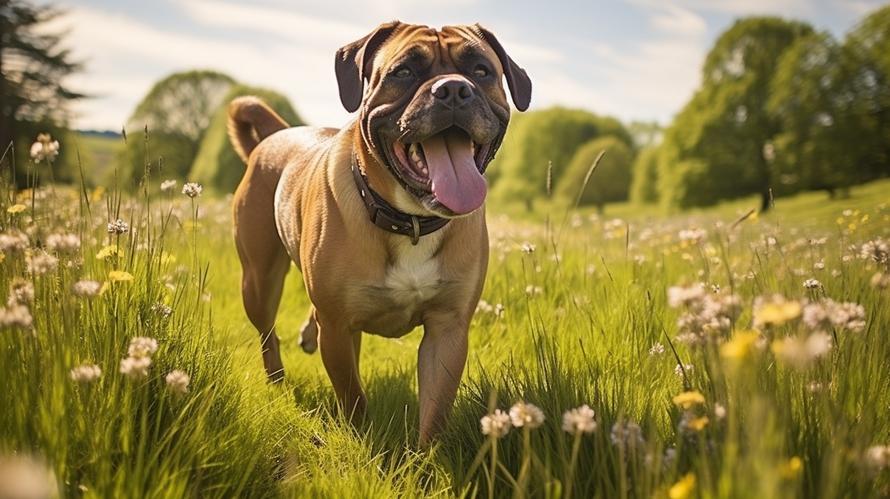Picture in your mind a colossal, gentle giant of a dog, affectionately playful and fiercely loyal, boasting a muscular body covered in a short, dense coat of brown, red, or fawn. You’re imagining a Bullmastiff, known for their solid build and undeniable strength, yet doubled by an undying devotion and a heart full of love for their human family.
Did you know that despite their large size, Bullmastiffs are known as ‘silent watchdogs’? They don’t bark much. Instead, they display their intelligence and courage by quietly sneaking up on intruders, backing them into a corner, and holding them there till their owner arrives. This ability comes from their origins in 19th century England, where they were bred to guard estates from poachers.
Now, think about what fuels such a massive dog with so much energy and power. It’s their diet, of course! Though Bullmastiffs are generally less active compared to smaller breeds, their diet plays a key role in their overall health and longevity. But does a Bullmastiff need special dog food? The short answer is yes and no. Intriguing, isn’t it? Let’s dig deeper.
The Bullmastiff’s special dietary needs primarily revolve around their size and their susceptibility to certain health conditions. Special dog food doesn’t necessarily mean an extraordinary or rare product. Instead, it refers to a balanced, nutritious feeding program specially tailored for their unique needs.
First, let’s talk about the size factor. Fully grown Bullmastiffs can weigh anywhere between 100 and 130 pounds, which suggest their bodies require more calories. However, although the breed is large, they are not as active and energetic as other breeds. This means they need food that’s high in quality proteins to build muscle, but not overly high in calories, which could lead to obesity.
Secondly, you need to be aware of the common health problems that could bother your Bullmastiff companion. For instance, they are susceptible to certain breed-specific issues like hip and elbow dysplasia, a condition that affects the joints. Appropriate levels of calcium and phosphorus in their diet can promote healthier joints. On the other hand, Bullmastiffs are also at risk of bloating, formally known as Gastric Dilatation Volvulus (GDV). This can be mitigated to a degree by adopting a feeding schedule that includes smaller meals given more frequently, rather than giving one large meal a day.
Moreover, Bullmastiffs can face skin allergies, and certain dietary adjustments can help keep these discomforts at bay. For instance, dog food with Omega-3 and Omega-6 fatty acids boost skin health and bring a shiny glow to their coat.
So, what should you feed your friendly giant? In general, feeding your Bullmastiff high-quality, commercially prepared dog food is recommended. These foods are typically formulated to meet the nutritional needs of dogs based on their size, breed, and age. Look for AAFCO (Association of American Feed Control Officials) approved brands that contain a proper balance of proteins, carbohydrates, fats, and supplementation of vitamins and minerals. It’s also key to look for real meat, like chicken, beef, or fish, to be one of the first ingredients listed.
But, buying special, breed-specific dog food isn’t always necessary. On the contrary, you can provide a well-balanced, nutritious diet for your Bullmastiff by feeding them quality, all-size, all-breed dog foods combined with proper dietary supplements, regular veterinary checkups, and an active lifestyle.
Specifically, when it comes to puppies, they need a more protein-rich diet for healthy growth. Feeding them larger-breed puppy food is a good idea as it is designed to support their growth and bone health. On the flip side, Bullmastiff seniors with slowing metabolism may require fewer calories. Your vet might recommend lower-calorie food options to maintain healthy weight.
Homemade food can also be a good option as long as it’s balanced and approved by a vet. Include proteins (cooked meat, fish), carbohydrates (pumpkin, sweet potato), healthy fats (flaxseeds, fish oil), and fibres (peas, carrots, spinach). Avoid additives, artificial colors, flavors, and preservatives as Bullmastiffs can be prone to allergies.
In summary, feeding your Bullmastiff doesn’t have to be complicated. Whether you choose special dog food or a balanced blend of commercial and homemade food, the key is to stay informed about their unique needs and concerns. Make sure you don’t overfeed them, maintaining a healthy weight is crucial. After all, food is the fuel for your Bullmastiff and with the right diet, these gentle giants can live up to their full potential, being the strong, loving, and protective companions we all love them for.
Remember that each Bullmastiff is unique and while these guidelines are generally beneficial, there can be variations. Consulting with a veterinarian nutritionist can be invaluable to determine the ideal diet plan for your Bullmastiff. After all, who knows these adorable, quiet giants better than they do?



